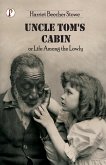Uncle Tom's Cabin describes the story of Uncle Tom, an enslaved person portrayed as innocent and honorable, respectable and ethical in his beliefs. While being shifted by boat to an auction in New Orleans, Tom saves the life of Little Eva, a lovely and forgiving little girl, whose thankful dad then buys Tom. Later, Eva and Tom become great friends. Eva is always in a delicate situation and starts to decline quickly, and on her deathbed, she requests her father to free all his enslaved people. He makes arrangements to do so but then finds out that he is killed by the cruel Simon Legree, Tom's new owner, who has whipped Tom to death when he refuses to tell him about where the slaves escaped. Tom maintains his constant Christian attitude toward his own suffering.








